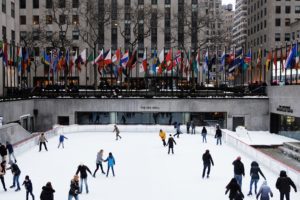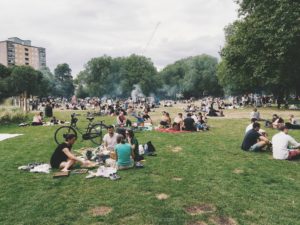
Where are you from? From the time I was born, this question has continued to define and influence my life until today. Back then, it seemed rather irrelevant. This fact that I was not just born into this world and into a family but also into a very specific location. But through that, I was officially part of a nation. My very first achievement. It was something to be proud of, almost as important as my own name. Naturally, I wanted that nation to be great, just like I wanted my family to be happy.
But this feeling changed over the years, maybe exactly because the former has nothing in common with the latter. Although we share institutions, laws, responsibilities, and rights in our society, we are not a community at all. When I meet another citizen on the street, I will not address him as such or respect him for the role he took up. I will just see another individual caught up in the same system as I am. Both of us never signed a social contract, never actively chose that system and have almost no way of choosing another. Compared to many existing alternatives, we were just lucky to be at the right place at the right time.
Through this slight change from feeling part of it to feeling caught up in it, I have lost something that is both incredibly important and very hard to find in our age of individualism: my political identity. I don’t think nationally, and many of those who do seem to try too hard. They say they are proud, but can rarely tell you what exactly they are proud of. They say they are the nation, but only mean their narrow social environment. I feel repulsed by this hollow kind of national identity, but at the same time, I can understand them because I also feel such a strong need for a political community.
My thought is that being only individuals with individual interests does leave us hollow because that is not what our brains evolved to be content with. We are a social species, after all. And we all have the need for an easy-to-grasp concept of who we are, so that we can tell it to ourselves and ultimately to others. A story, in other words, that becomes our identity. It can give us meaning or status and is something that we can hold on to at all times.
Real and imagined
There are two kinds of things that we are able to identify with. First are those that are real, things that we can touch, smell, and sometimes even talk to. So, what falls into this category when we are talking about citizenship? The first thing that comes to mind are those places where we actually feel at home. The people and communities that we know and understand well. The trees that we have seen grow over the years. The food that we like to eat and are able to prepare on our own. The houses we have built and the material possessions we have gathered. These are all parts of our society that we can identify with and that will remain, even if we stop believing in everything else. Many of our political ambitions are bound to this category. For in the end, we care about our status among the people that we know and the real stuff that we can have access to or are protected from.
The second category consists of concepts and ideas that are imagined, existing only in our minds. If they settle in many minds at the same time, they become collective imaginations. Societies are all about these. You might, for example, believe in certain morals or forms of justice. Or in money, which is completely worthless without a collective belief in its value. Or in the nation-state. And even though these things are not real in any literal way, they define our lives to an astonishing extent. An interesting insight for the topic of this text is that the things in this category do not have territorial boundaries. They can be universal. If you believe in human rights, for example, they (should) apply to all humans, independent of where they are born.
Our political identity seems to be a combination of these different things, both real and imagined, territorially bound and potentially universal. Our citizenship, however, is usually one-dimensional and clearly bound to a location. Human rights clearly depend on where you are born. There is no global justice as environmental and social costs of all the stuff we produce are just outsourced to weaker nations. And when it comes to global problems like climate change, we fail to find a solution.
Sketching a political alternative
This perspective provokes the following thought: What if we could have different kinds of citizenship, the local and social part that has always been human on one side and on the other the universal, unbound by borders, that is needed to organize a society of our size and complexity?
Let us lean back for a moment, forget what is normal all around us and imagine what it would mean to live in such a system. We’d be a citizen of our hometown with cultural roots, where we have family and friends. We would always be part of that community and enjoy the possibility to move back there and be treated like a local. When we move to a new place, we would become a citizen of that region as well, which could be anywhere around the world. The political agenda in these places would be about local issues and the community, very close to our daily lives and needs. And thus, we would be included in the political process of this region by default, just because we live there. Everyone’s culture and life are connected to those around them and therefore everyone must be part of the discussion about it. Politics would be more interactive, deliberate and participatory. It would be small enough for us to grasp it as human beings. Feeling part of the culture and the system would be intuitive, very unlike the roaming alienation of today. As Ernst Friedrich Schumacher once put it: Small is beautiful.
Of course, the world has become too big, too connected and too interdependent to be just this. Many actors, especially in the economy, have already reached a global level of power and influence. Every region or city on its own will not be taken seriously on this scale. If we don’t find a solution to climate change or rising inequality with our nation-states, how would it help to make things smaller? So, while I think we need politics on this small scale to truly become part of it again, we also need politics that go beyond the local at the same time.
We need to address those universal concepts and values that we have just discussed. Can we imagine an international political body that can be joined and left by both individuals and those regions? A political system that is designed to go beyond territorial thinking? With a few differences, it could be similar to the European Union of today. But it would not be bound to Europe. And the local citizenships just discussed would be separated from such an international one. The union’s parliament would be elected directly by its citizens, without some nations or other systems in between. Just like with the concept of political identity, we would need to carefully and democratically discuss what makes sense on a local level and what should go beyond.
A region that is part of such a union would, of course, promote that its residents may easily become part of that bigger system, too. But it would be absolutely possible that one could be part of a region without being part of the roof and part of a roof without being part of the region. And so, to become a citizen of a bigger system, we would actually have to learn, understand, accept, and finally sign a social contract. Our region could help us to succeed in this step through education. It could become a normal part of growing up. But there would be some conscious choice in it, which might be the key to identify with something that otherwise just feels far away and too big to comprehend.
Ulrike Guérot made a very practical example of this perspective after the Brexit Referendum: Millions of voters didn’t want Brexit. Why should they lose EU citizenship? Why did their European identity depend on the political development of their state? They still feel European and one could argue that they have been part of this system long enough to keep their identity and rights as Europeans.

Our political imagination
Thinking about utopian alternatives like the one above can be abstract and just as hard to identify with as our current system. But it is important to expand our political imagination. To challenge the problems of our time, we need to be able to think and debate about alternatives to our current political structures. And being a free citizen of something that is not necessarily territorial is something thinkable, desirable and could foster a more fluid system full of new political possibilities and experimentation.
And as always, we can start small. By building communities that can at least imagine such a future and maybe start to live it early. Societies have always been about shared trust in things that are only imagined. And being a member of such communities could be much like being a citizen of a nation today. It may even fill this hole of identity through more political choice and interaction.
Unsere Zeit’s series on Citizenship and Territoriality presents international, original contributions on the question of how the interplay of citizenship and territory works in a globalized world – and how it should be, and can be, changed.